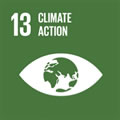Por favor, use este identificador para citar o enlazar a este item:
http://hdl.handle.net/10261/228460COMPARTIR / EXPORTAR:
 SHARE
BASE SHARE
BASE
|
|
| Visualizar otros formatos: MARC | Dublin Core | RDF | ORE | MODS | METS | DIDL | DATACITE | |

| Título: | Advancing food-web modelling capabilities to analyse global ocean futures |
Autor: | Coll, Marta CSIC ORCID ; Steenbeek, Jeroen CSIC ORCID; Buszowski, Joe; Garilao, Cristina; Pennino, Maria Grazia CSIC ORCID; Kashner, Kristin; Lotze, Heike K.; Rousseau, Yannick; Tittensor, Derek P.; Walters, Carl J.; Watson, Reg; Christensen, Villy | Palabras clave: | Climate change Fishing impact Global ocean Future trajectories |
Fecha de publicación: | jul-2020 | Citación: | Abstracts volume VII International Symposium on Marine Sciences: 111-112 (2020) | Resumen: | There has been considerable effort to predict the impact of climate change and anthropogenic activities on the biophysical environment, biodiversity, and marine resources at regional and global scales. To further our understanding of how changes in the environment and marine resources will affect marine ecosystems, there is a need for advancing global integrated assessments. We improved a previously developed spatial-temporal ecosystem model of the global ocean (EcoOcean) (Christensen et al., 2015), spanning food web dynamics from primary producers to top predators, and including worldwide fisheries. We enhanced its ability to reproduce spatial-temporal ecosystem dynamics by linking spatial-temporal species dynamics and distributions to main environmental conditions that change under climate impact (e.g. primary production, sea surface temperature), accounting for varying species compositions of species groupings over time and space (Coll et al., submitted). The updated modelling platform was used to simulate past and future scenarios of climate change and fisheries, considering structural uncertainty and alternative input drivers using standardized outputs from Earth-System Models (ESMs) and contrasting emission scenarios using the Representative Concentration Pathways (RCPs) for historical (1950-2005) and future (2006-2100) periods. Ecological aggregated indicators and biomass from species groupings were used to compare ecological predictions among scenarios following a standardized protocol (Tittensor et al., 2019; Lotze et al., 2019). Comparing results from scenarios with and without fishing allowed us to evaluate how climate-driven responses differed between fished and hypothetically non-fished oceans. The study sets a baseline to further develop global ocean analyses and contribute to the quantification of cumulative effects assessment of multiple stressors and plausible ocean-based solutions to global change, considering species, biodiversity and food-web spatial-temporal dynamics | Descripción: | VII International Symposium on Marine Sciences (ISMS 2020), 1-3 July 2020 (Barcelona).-- 2 pages | Versión del editor: | https://isms.cat/wp-content/uploads/2020/09/libro-ISMS-2020.pdf | URI: | http://hdl.handle.net/10261/228460 | ISBN: | 978-84-120734-7-8 |
| Aparece en las colecciones: | (ICM) Comunicaciones congresos |
Mostrar el registro completo
CORE Recommender
NOTA: Los ítems de Digital.CSIC están protegidos por copyright, con todos los derechos reservados, a menos que se indique lo contrario.


